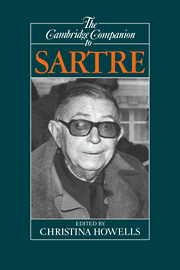Introduction
Published online by Cambridge University Press: 28 May 2006
Summary
This collection of essays, by some of the foremost interpreters of Sartre from Europe and the United States, was composed specifically for the new series of Cambridge Companions to Major Philosophers. None of the essays has been published previously elsewhere. The contributors range from the most senior and established Sartrean scholars to some of the most promising and lively of the younger generation of critics. As editor, my task was to commission a broad range of essays, covering the major aspects of Sartre's philosophical work and its implications, in line with the purpose of the new Cambridge series. What struck me most forcibly on receipt of the typescripts, was the originality, density, and cohesion of the interpretations. They not only present a generous and balanced view of the wide variety of Sartre's philosophy, but also all make a contribution to the “new” Sartre, that is to the view of Sartre which has been gradually emerging since his death in 1980, as a figure whose diversity was far from being mastered, who could not, without distortion and impoverishment, be identified with the “classical existentialist” of the 1940s, and whose relationship to Structuralism and Post- Structuralism, as well as to psychoanalysis, Marxism, and literary theory, was far more complex than had been generally supposed. Suffering, since the 1960s, from the backlash of rejection that exceptional popularity and fame brings in its wake, Sartre was commonly used as the humanist target against whom nascent Structuralist, Marxist, and Deconstructionist critics could test their arms.
- Type
- Chapter
- Information
- The Cambridge Companion to Sartre , pp. 1 - 10Publisher: Cambridge University PressPrint publication year: 1992
- 1
- Cited by



